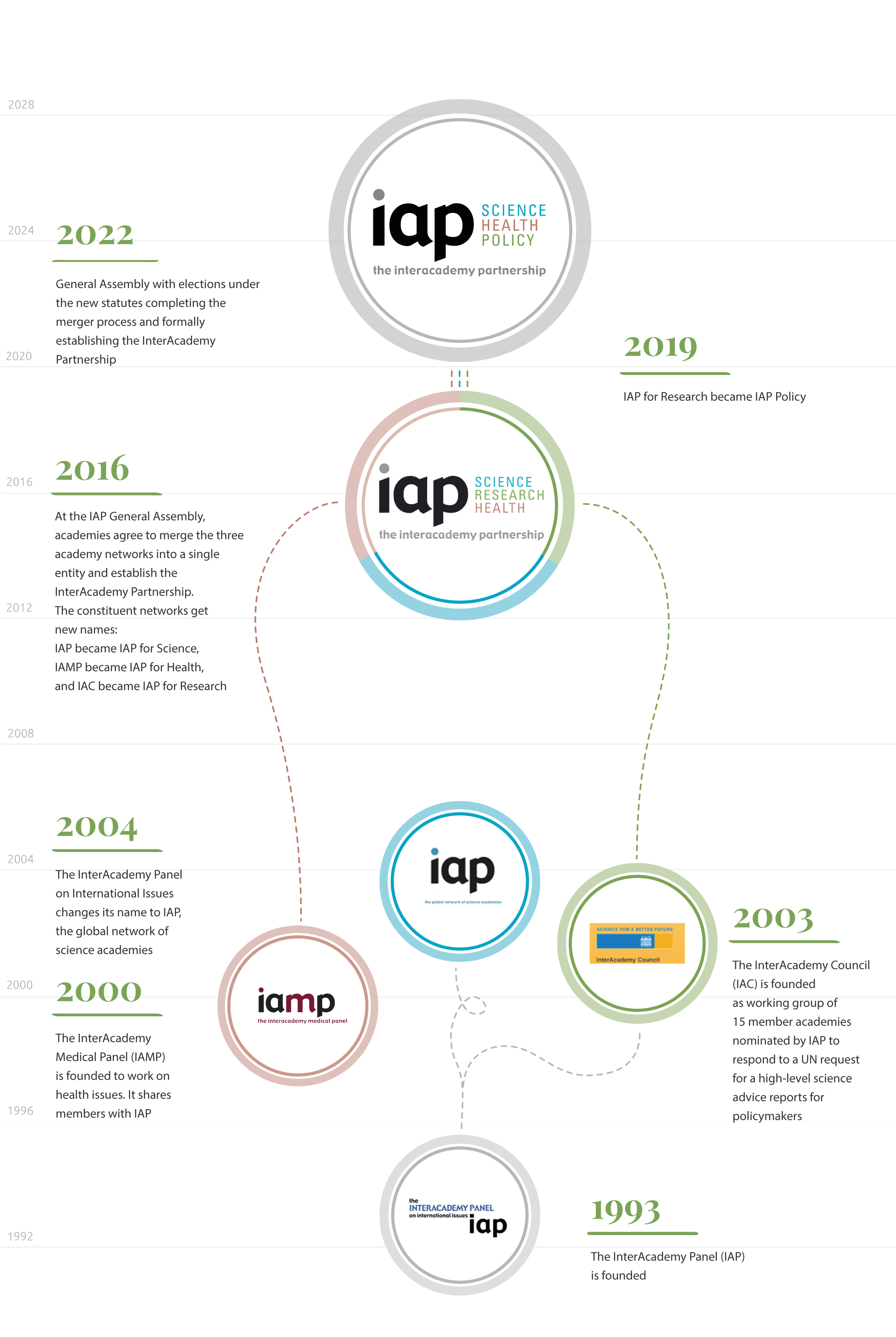History
From 2016, at the IAP General Assembly in Hermanus, South Africa, three established networks of academies of science, medicine and engineering merged to become the InterAcademy Partnership (using the acronym, IAP, originally used for the InterAcademy Panel of science academies).
These three original networks - the InterAcademy Panel, the InterAcademy Medical Panel (IAMP) and the InterAcademy Council (IAC) - were founded in 1993, 2000 and 2000, respectively. From the Hermanus meeting in 2016, they were re-named IAP Science, IAP Health, and IAP Policy (see below).
As the InterAcademy Partnership worked towards creating a cohesive network of academies with a single identity, the science, health and policy 'divisions' were gradually blurred. During 2020, discussions began on a new set of statutes for the InterAcademy Partnership, effectively merging the three sets that had been operative until this point. These new Statutes, endorsed by the majority of IAP member academies and published in August 2021 (available here), set out a new governance structure for IAP. During 2022, in the run-up to the 2022 General Assembly held in Arizona, USA, online elections were held based on these new Statutes and the new governance structure.
Following the 2022 General Assembly, the newly elected leadership of IAP engaged closely with developing the first integrated Strategic Plan for the InterAcademy Partnership. It is this Strategic Plan (2024-2026) that guides the activities of the organisation today.
Today, IAP works through two secretariats, one hosted by The World Academy of Sciences (TWAS, a programme unit of UNESCO) in Trieste, Italy, the other hosted in Washington, DC, by the US National Academy of Sciences.
- - - - - -
IAP Science brought together member academies to advise the global public and decision-makers on the scientific aspects of critical global issues, such as poverty, sustainable development, climate change, biotechnology and global health. It also worked to improve science education and scientific literacy in member countries across the globe. The original inter-academy network, IAP Science was founded as the InterAcademy Panel in 1993. Originally hosted by the UK's Royal Society, IAP has been hosted by TWAS in Trieste, Italy, since 2000.
IAP Health was a network of the world's medical academies and medical sections of academies of science and engineering. Founded in 2000 as the InterAcademy Medical Panel (IAMP), it committed to improving health world-wide, with goals to strengthen the capacity of academies to provide evidence based advice to governments on health and science policy; to support the creation of new academies; to support the creation of projects by member academies to strengthen research and higher education in their countries; and to issue consensus statements on matters of importance to global health. From its establishment in 2000, IAMP/IAP Health was hosted by TWAS in Trieste, Italy.
IAP Policy was founded in 2000 as the InterAcademy Council, and mobilised the best scientists and engineers worldwide to provide high quality, in-depth advice to international organisations and national governments on critical scientific issues. Reports focused on building scientific and technological capacity worldwide; achieving a sustainable energy future; enhancing African agriculture; a review of the processes of the UN’s Intergovernmental Panel on Climate Change (IPCC); scientific responsibility in global research; and the science community’s role in achieving the Sustainable Development Goals (SDGs). From its foundation in 2000, IAC was hosted at the Dutch academy of sciences (KNAW), before moving to the US National Academy of Sciences.


The IAP Co-Presidents
2014: Mohamed Hassan and Volker ter Meulen
2015: Krishan Lal and Volker ter Meulen
2017-2019: Depei Liu and Volker ter Meulen
2020: Depei Liu, Volker ter Meulen and Richard Catlow
2021: Depei Liu and Richard Catlow
2022-2024: Masresha Fetene and Peggy Hamburg
Read more about the IAP Governance here.